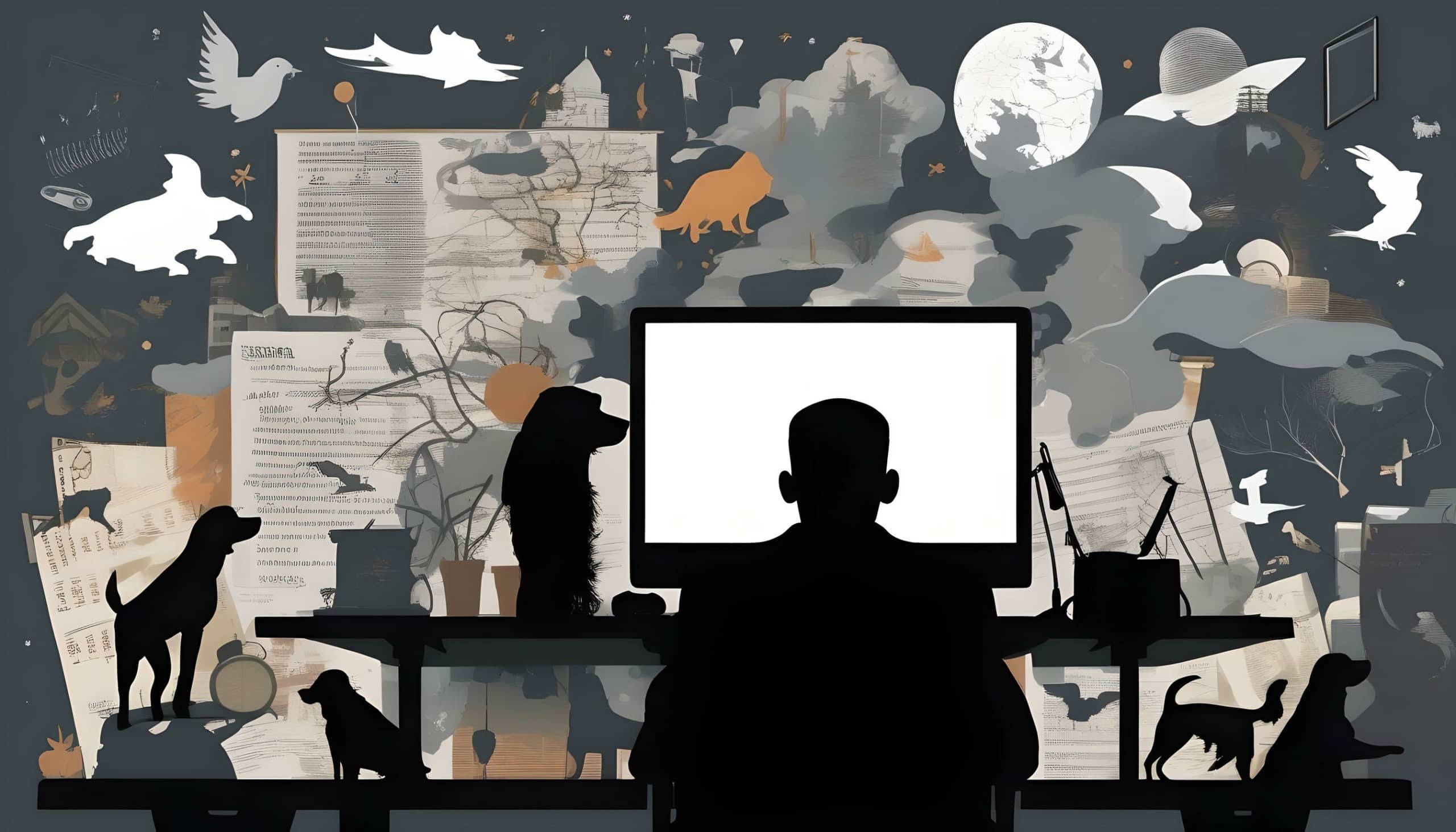
“Hello, Mr. Metz. My name is Jessica. I'm a nurse from the doctor’s office. Your test results came back as positive, and he wants to schedule you to redo the procedure.”
My blood ran cold. “Positive… for what?” I asked.
I knew what the answer was. I think even she knew that I knew what the answer was. I just wasn’t expecting the answer.
She couldn’t address the question directly. There was no "good" way to say the "C-word." There was a pause, and then she said, “There was some DNA found in the…”
I didn’t really hear the rest. A whooshing sound filled my ears, kind of like when you dip your head under water.
“… and we can fit you in next Friday,” she finished.
My eyes flicked over to the calendar. It was January 3. The year had only just begun. For some reason, looking at the upcoming schedule turned everything into part of the routine. We’d like to get together to discuss an important topic, do you think you could meet with us and the client for an hour? What does your calendar look like?
As I was looking, she reminded me that I needed to have some of the medications out of my system, so it got pushed to January 26. 3 weeks. Everything should be okay by then.
"Okay" is a very, very relative word.
After the age of 50, men need to get checked for cancer as the risk goes up considerably. Several of my friends have gone in thinking they were fine, only to find out that they had waited just a year or two too long. What followed for them was two- to three years of a hellscape of chemotherapy, surgeries, and violations of their dignity beyond fathoming.
I’ve done my annual physicals, had the bloodwork included quarterly with my diabetic screenings. Everything always came back negative. I had never had any expectation that the results would be anything other than perfectly fine.
Until it wasn’t.

Three Weeks
The day before I had been invited to give a presentation to a technical conference in July. Very prestigious, and I’d never been an invited speaker before. Now I wondered if that was going to be possible.
I had been making arrangements to travel back to Namale as an anniversary present to my wife – last year was our 10thwedding anniversary but we had to put it off because of house repairs. I had just gotten the quotes and had to tell them that I couldn’t commit until the week of the 29th of January.
Of course, I didn’t tell them why. After all, I didn’t know for sure myself. But what good would making long-term plans be if I wasn’t going to be able to fulfill the commitments?
Long-term plans.
For the first time in my life, I started thinking about long-term plans, and what that would actually mean. This wasn’t some academic, philosophical line of questioning – I began to wonder if I had enough time to get things in order. I didn’t want to leave my wife struggling.
Thoughts swirled in a maelstrom constantly. Everywhere I looked I thought about how much I needed to do, how much I had wanted to do. I have books on my bookshelf that I’d been planning to read for years. Movies in my collection. Stories that I wanted to write. How much time was there left to do any of that?
I’ve been preparing a nest egg for her in case something happens, but was it enough? I’d prepared account numbers, insurance, every financial detail into a spreadsheet whenever I had thought of it, but there was always something more, something I’d missed. What if I missed something crucial?
Suddenly all the things that we had weren’t an asset, they were a liability. All the items in the workshop, the Jeeps that weren’t finished – would I have time to finish them? Not so that I could enjoy them, but so that she wouldn’t have to dispose of a bunch of parts? Should I sell my precious Ghost and Spyder to help offset any medical costs? I mean, I’ve long gotten every possible insurance available to me “just in case,” but who knows what unexpected expense comes along?
I’d heard about people who refused to go through the chemotherapy, that even oncologists themselves would refuse the treatment if they were diagnosed. Would that really be an option? Or is that just “giving up”?
In ways that are difficult to explain, it all became very, very real.

What We Leave Behind
There was no control over the thoughts that went through my head.
It felt rather bleak. Time doesn’t march on, it races on. Work colleagues come and go, and when they do it always seems like they’re out of mind only a split second after they’re out of sight. Is it better to “die in office” than disappear only to have people reflect after a few months and say, “Oh yeah, he was a nice guy. What a shame. Anyway…”
I thought about all the work that I’d done in my career, and wondered whether or not it was truly as influential as I had wanted it to be. As I took stock of my contributions to the tech industry – whether it be my situation for SNIA, NVM Express, Ultra Ethernet Consortium, the Fibre Channel Industry Association, or any of the less-visible projects – was it enough?
Worse, did it even matter?
Let me put that another way – was the work/life ratio balanced enough to make it matter? That’s actually a much fairer way of thinking about it.
When all is said and done, how much more are we than the sum of the impressions we leave behind? I’ve often said, “Don’t do anything you don’t want to be remembered for.” I have also realized that I didn’t start saying that until afterI’ve probably done something that I didn’t want to be remembered for…

The Comfort of Silence
I thought long and hard about who to tell, and who not to tell. After all, I didn’t have the information from the third test (yes, the 26th represented the third test; the first was inconclusive which necessitated the second test, which came back positive).
Ultimately, I decided the answer was no one.
This may come as a bit of a surprise to some who don’t know me very well, but I’m not one who likes a lot of attention. I didn’t want people to constantly ask how I was, whether I was okay, if I needed anything (but who wouldn’t have been able to provide anything anyway). The cynical part of me didn’t want to deal with false expressions of concern, and the genuine part of me didn’t want to burden the people who truly care with emotional baggage of which they could do nothing at all.
This of course had its moments of awkwardness. Just a few days ago someone asked me to do a task of which I’m the wrong person for the job. It came with a lot of political pressure, though, so I tried to beg it off by keeping it focused on the fact that the request would not lead to what anyone wanted. Inside, though, I kept thinking, “if this really goes south, I don’t want to be remembered for this catastrophic failure. This is not the last impression I want to make!”
Day in, day out. Meeting after meeting. Work went on, life went on. In both SNIA and Ultra Ethernet, we’re talking about upcoming events for 2024 and 2025. The expectation that I’m going to be there to do Chair stuff – give keynotes, interviews, presentations, coordinate and organize. The uncertainty of whether or not I can make promises I’m not sure I can keep.
Behind the scenes I’m making lists, planning things out. Who I need to tell, and when. Need to make sure everything is covered, that no one is let down.
In my internal thought process, I’m still working. I’m not going to just sit around and wait.

The Test
Last week was rough. I’m not going to mince words, here: I couldn’t sleep all week, and every waking moment was filled with a mixture of dread and eagerness to get the answer.
“Are you excited about it?” my wife asked me on Thursday night.
I thought about it for a moment. At first, I didn’t think “excited” was the right word, but then I realized it was precisely the right word. There was an excitation to be sure, just not one of enthusiasm. Rather, it was an excitement of anticipation, of being excited of the revelation of the answer after three weeks of stress.
“Yeah, I guess I am,” I said.
Normally the prep requires an all-liquid diet the day before, but that hadn’t produced the necessary results the first time. So, I prepared by starting three days earlier, and the previous two days was mostly fluids (soups, etc.). By the time Friday rolled around, I had actually broken through the hunger pangs and didn’t feel like I was starving any longer. I lost 8 pounds in less than a week.
We arrived at the hospital at 6:30 a.m. Even that early, there was a queue and I wasn’t brought in until around 9. Being wheeled around the floor in the hospital bed I gave my best “royal parade wave” of hellos to the staff, projecting a sense of humor that I didn’t genuinely have.
“Weren’t you in here, like, a month ago?” the nurse asked, looking at my name.
“Yep,” I said. “Was such a fun ride I looped around and got back in line again.”
She smiled, but I wasn’t sure if it was just from professional courtesy. Yeah, most likely. “I thought so,” she said. “I knew I recognized your name.”
“It is rather distinctive,” I admitted.
The anesthesiologist directed me into the proper position and adjusted the oxygen mask.
"Comfortable?" he asked. How do you respond to that question at a time like this?
I saw him inject the anesthesia into the port that had been embedded into the back of my hand. It was a white, milky liquid that looked something straight out of a movie.
“It’ll take a moment to kick in, but you will start feeling a little sleepy,” he said.
Just let it happen, don’t try to stay awake. I don’t know why there was a moment of stubbornness and resistance, as if for some reason it was important to struggle against the drug. It made no sense.
I looked over his shoulder at a poster on the wall. He was a very large man and blocked nearly all of it, but I remember the words “SAFETY MAINTENANCE” as the last thing I saw before I closed my eyes.

Results
Unlike the first time, I dreamed. I walked around a building, very similar to the hospital I was in. Small gardens in enclosed areas were on the floor, interspersed with the nurses stations and hospital beds. It was quiet, silent even, until I started hearing the normal noises you’d expect in a hospital.
I felt myself pulled out of the dream and started to awaken. I was in the exact same position I had been when the anesthesia kicked in. I rolled over to see the nurse next to me, typing into her computer.
“Welcome back,” she said, smiling.
I couldn’t wait any longer. “What’s the good news?” I asked. My throat was dry and rough. I felt like I had been gargling with gravel.
“It was better this time,” she said. “He could see everything, and you are completely clear. No polyps, no signs of anything abnormal. The Cologuard test was a false positive. So, he wants you to come back in ten years.”
Ten years?
I raised an eyebrow. She nodded and grinned. “Yup, you’re on the ten-year plan.”
I smiled. “May I have some water?”
After being instructed to go home and rest for the remainder of the day, I was discharged from the hospital. My wife drove us home, both of us relieved beyond words. Somehow, the dogs knew that it was a different kind of day, and were very affectionate all day. Even Duncan, who is the most aloof dog I’ve ever seen in my life, was constantly by my side and looking for constant attention.

Just Do It
Timing is key. One of the things that I’ve noticed is that those who have had the worst experiences (and yet survived) are the ones that waited to go for the testing. No one wants to do a colonoscopy.
As I said, I’ve been getting bloodwork done on a quarterly basis to check for any abnormal results that could indicate cancer, and they always came back negative. Likewise, annual physicals never revealed anything either. So, I wasn’t expecting anything other than a clean bill when the news came in.
The fact that it was a false positive does not change the fact that it could very well have been a reality. Had the doctor found any polyps, he said, he would have sent them off to be tested and I would be asked to come back in 5 years even if they were benign. If they were not benign, we would have been having a very different conversation. The fact that he gave me an all-clear for 10 years is a big, big deal, as he could have said 5 just to be safe.
Because of that, I’m adding my voice to those who raised theirs to get me to go test. My good friend Glenn Tapley fought his cancer for nearly 20 years, and spoke openly and honestly about his experiences. I’ll never forget his Toastmasters speech as he began his therapy, extolling the need to get tested and how if he had only been tested one year earlier, his would have been a very different story to tell.
I was in my early 30s at the time, but what he said stayed with me. He had concluded his speech with “if I can persuade even one person, then all of this will be worth it.” Somehow, I find it nearly impossible to believe that it could be “worth it,” but he absolutely persuaded this person to go get tested – even 20 years after that one 5-minute speech.
One of the gravest mistakes people make is to assume that “a crisis averted was never a crisis at all.” The fact that the test gave a false positive does not mean that the risk wasn’t there, nor that something couldn’t have been found that could have avoided Glenn’s type of suffering.
There is no ‘magic’ year for doing it, and there is no sugar-coating the fact that it is an unpleasant experience (putting it mildly). But the alternative is much, much worse. While it’s very important for men to get it done, women (I’m told) should also consider speaking with their physicians about whether they need to do it as well.
Regardless, in the hopes that I can pass it forward like Glenn did to me, I implore you to get it done. As I said, I was in my early 30s when I was taught the lesson, but held on to it until it was time. It just means that you need to make sure that when you need to do it, you do it. Please.
Please.


Comments
I’m pleased to hear that you got a clean bill of health!
Wow J. Beautifully written and compelling. Don’t know why I found your story today, but I was just speaking to my brother about this very topic last week. He is 60+ and has never had one! We have a father who did indeed have polyps, but luckily they were benign. My sister and I did ours in our early 50’s. I was lucky to get the diagnosis you got at the end of January. All clear for ten years! My sister was not as lucky, and has to get one done every two years. I am feeling like the universe is guiding me to send this article to my brother now (I will), and continue to push him to make the appointment and have the procedure done. Thank you for inviting us in to your very personal medical crisis. You have helped one person today to realize how important this is for men to get done!
Thank you for your kind words. 🙂
I am Kelly’s brother, Mark, and yes, she did bring this subject up to me. Kel, I will have the discussion with Shirley and my doctor.
By the way, a very good article,
Mark